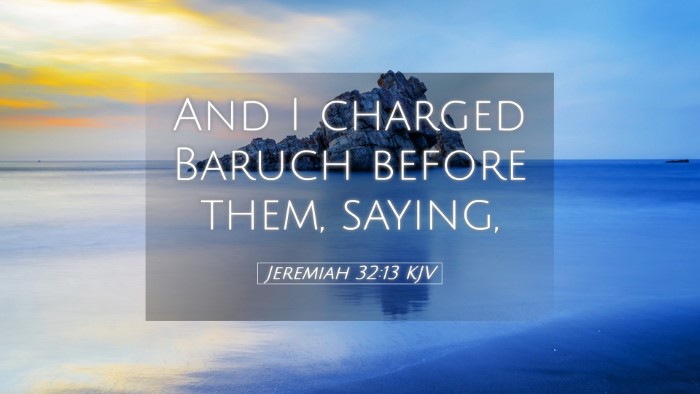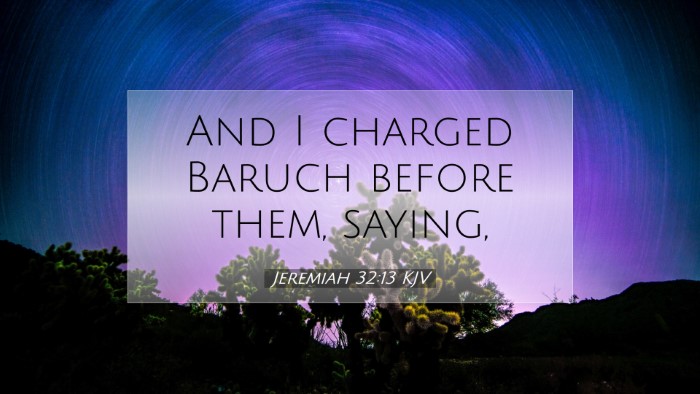Bible Commentary on Jeremiah 32:13
Verse Context: Jeremiah 32:13 states, "And I charged Baruch before them, saying," This verse falls within a significant moment in Jeremiah's life where the prophet is instructed by God in the context of a dire situation—the siege of Jerusalem by the Babylonians. Jeremiah, being a prophet, often faced the challenge of conveying God’s messages amidst overwhelming despair.
Commentary Overview
In examining this verse, notable commentaries provide rich theological insights that illuminate the profound nature of Jeremiah's mission and the historical context in which he operated. The interpretations draw on the authority of the text and the practical implications for faith communities today.
Insights from Matthew Henry
Matthew Henry highlights the significance of Jeremiah's role as a prophet during tumultuous times. He emphasizes that Jeremiah's charge to Baruch serves not only as a directive but also as a testament to the importance of faithful service and obedience to God's commands.
- Prophetic Authority: Henry notes that prophets like Jeremiah were tasked with relaying God’s messages, maintaining that this truth has not waned even in challenging circumstances.
- Encouragement in Adversity: The act of charging Baruch reflects the support that true leaders provide to their associates, suggesting that God’s mission requires teamwork, especially in the face of trials.
Insights from Albert Barnes
Albert Barnes offers a historical and theological exposition of this passage, considering both the immediate and far-reaching implications of Jeremiah's declaration.
- Historical Context: Barnes points out that the act of buying a field, which precedes this verse, illustrates a prophetic act of faith—despite the impending doom, God’s promise of restoration remains.
- Spiritual Implications: He interprets the act of charging Baruch as symbolizing God's assurance that, amid judgment, hope remains, which can inspire believers to trust in divine restoration.
Insights from Adam Clarke
Adam Clarke provides a detailed verse-by-verse analysis, focusing on the practical implications of Jeremiah's actions and the broader theological themes at play in this portion of scripture.
- Divine Instruction: Clarke emphasizes that God's commands to Jeremiah indicate His sovereignty, showing that God remains actively involved in His people’s affairs regardless of their circumstances.
- The Role of Baruch: He also outlines Baruch’s role as an essential scribe and assistant to Jeremiah, highlighting the importance of support and collaboration in fulfilling God’s will.
Theological Themes
This passage encapsulates several key theological themes relevant to pastors and scholars:
- God’s Sovereignty: The charged command reflects the divine control over history, reminding readers that God is present even in calamity.
- Faithfulness and Obedience: The active obedience of both Jeremiah and Baruch illustrates a model for contemporary believers on how to engage in ministry amidst uncertainty.
- Hope and Restoration: Ultimately, the narrative reveals God’s intent to restore His people, urging the faithful to remain hopeful and expectant in the face of trials.
Practical Applications
For pastors and theologians, the insights drawn from this verse encourage reflection on the following practical applications:
- Mentorship: Just as Jeremiah guided Baruch, leaders today should seek to mentor and empower others in faith.
- Living out Faith Under Pressure: Followers of Christ are called to live out their faith boldly, even when circumstances may seem dire.
- Community Resilience: This passage encourages communities to hold onto hope and work collaboratively towards common goals, even in challenging situations.
Conclusion
Jeremiah 32:13 serves as a vital expression of God’s faithfulness and the call to obedience amidst adversity. The extensive commentary from public domain sources provides a depth of understanding that can inspire and challenge both the church leadership and its members. The lessons learned through Jeremiah’s life and his instruction to Baruch continue to resonate, offering guidance on maintaining faith, hope, and purpose in God’s sovereign plan.


